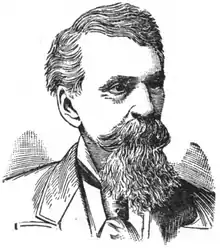Albert G. Riddle
Albert Gallatin Riddle (May 28, 1816 – May 16, 1902) was a U.S. Representative from Ohio.
Albert Gallatin Riddle | |
|---|---|
 | |
| Member of the U.S. House of Representatives from Ohio's 19th district | |
| In office March 4, 1861 – March 3, 1863 | |
| Preceded by | Edward Wade |
| Succeeded by | James A. Garfield |
| Member of the Ohio House of Representatives from the Geauga & Trumbull Counties district | |
| In office December 4, 1848 – December 1, 1850 | |
| Preceded by | Anson Matthews |
| Succeeded by | M. C. Bradley G. H. Kent |
| Personal details | |
| Born | May 28, 1816 Monson, Massachusetts |
| Died | May 16, 1902 (aged 85) Washington, D.C. |
| Resting place | Rock Creek Park |
| Political party | Republican |
Early life
Born in Monson, Massachusetts, Riddle moved with his parents to Newbury, in the Western Reserve of Ohio, in 1817. He completed preparatory studies, and then studied law.
Career
Riddle was admitted to the bar in 1840 and began practice in Geauga County, serving as prosecuting attorney of that county 1840-1846. He served as member of the Ohio House of Representatives 1848-1850, and in 1848 called the first Free Soil convention in Ohio.
Riddle moved to Cleveland, Ohio, in 1850. He was elected prosecuting attorney in 1856, and in 1859 he defended the Oberlin slave rescuers. He served as a Republican in the Thirty-seventh Congress (March 4, 1861 – March 3, 1863), making speeches in favor of arming slaves, the first on this subject that were delivered in Congress, and others on emancipation in the District of Columbia and in vindication of President Lincoln. He was not a candidate for renomination in 1862.
After his term in Congress, Riddle served as consul at Matanzas, Cuba, in 1863 and 1864. He then returned to Washington, D.C., and again engaged in the practice of law. He was retained by the State Department to aid in the prosecution of John H. Surratt as one of the accomplices in the murder of President Abraham Lincoln. He also served as law officer of the District of Columbia 1877-1889. He was in charge of the law department at Howard University for several years after its establishment.
Death and legacy
Riddle died in Washington, D.C., May 16, 1902. He was interred in Rock Creek Cemetery.
His papers are at the Western Reserve Historical Society, Cleveland, Ohio. They include the unpublished manuscript "Accounts of experiences in Cuba" (1862-1864).
Works
- Students and Lawyers, lectures (Washington, 1873)
- Bart Ridgeley, a Story of Northern Ohio (Boston, 1873)
- The Portrait, a Romance of Cuyahoga Valley (1874)
- Alice Brand, a Tale of the Capitol (New York, 1875)
- Life, Character, and Public Services of James A. Garfield (Cleveland, 1880)
- The House of Ross (Boston, 1881)
- Castle Gregory (Cleveland, 1882)
- Hart and his Bear (Washington, 1883)
- The Sugar-Makers of the West Woods (Cleveland, 1885)
- The Hunter of the Chagrin (1882)
- Mark Loan, a Tale of the Western Reserve (1883)
- Old Newberry and the Pioneers (1884)
- Speeches and Arguments (Washington, 1886)
- Life of Benjamin F. Wade (Cleveland, 1886)
- Recollections of War Times, 1860-65
References
- United States Congress. "Albert G. Riddle (id: R000238)". Biographical Directory of the United States Congress.
- Rines, George Edwin, ed. (1920). . Encyclopedia Americana.
- Wilson, J. G.; Fiske, J., eds. (1900). . Appletons' Cyclopædia of American Biography. New York: D. Appleton.
External links
- Works by Albert G. Riddle at Project Gutenberg
- Works by or about Albert G. Riddle at Internet Archive
![]() This article incorporates public domain material from the Biographical Directory of the United States Congress website http://bioguide.congress.gov.
This article incorporates public domain material from the Biographical Directory of the United States Congress website http://bioguide.congress.gov.
| U.S. House of Representatives | ||
|---|---|---|
| Preceded by Edward Wade |
Member of the U.S. House of Representatives from Ohio's 19th congressional district 1861–1863 |
Succeeded by James A. Garfield |
